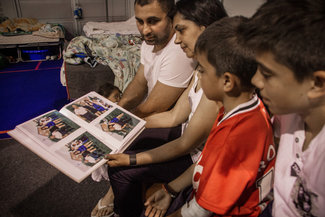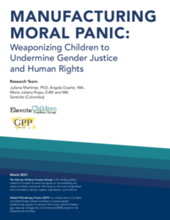

Displaying 441 - 450 of 1071
"The COVID-19 pandemic has had a significant impact on the judicial practice in cases of international adoption," says this article from the Russian Legal Information Agency (RAPSI).
This paper fills a gap in specialized knowledge regarding continuing professional development (CPD) in social work in Romania by examining how child protection Romanian social workers experience CPD throughout their professional lives.
"A woman who left her infant son in a baby hatch – which can be used to safely and anonymously abandon babies – is now fighting in court to get him back," says this article.
This paper explores discourses that have informed debates concerning care leavers in Romania over the last 50 years to understand why rights‐based reforms introduced in the mid‐2000s have been difficult to implement.
Este seminario web es el segundo de una serie de la Plataforma de colaboración global Transforming Children's Care. En el seminario web, Philip Goldman de Maestral International presentó una nueva guía sobre gasto público y cuidado de los niños producida por Changing the Way We Care, que está diseñada para fortalecer la capacidad de las agencias gubernamentales en países de bajos recursos para preparar un marco presupuestario sólido.
This webinar is the second in a series for the Transforming Children's Care Global Collaborative Platform. In the webinar, Philip Goldman from Maestral International presented new guidance on Public Expenditure and Children’s Care produced by Changing the Way We Care, which is designed to strengthen the capacity of government agencies in low resource settings to prepare a sound budgetary framework.
This is a speech delivered by Catherine Russell, UNICEF Executive Director, at the World Economic Forum March 21, 2022. She details the ongoing work UNICEF Ukraine is doing on the ground even as child casualties continue to grow.
UNICEF Moldova is seeking a consultant to conduct a review of laws and regulations related to guardianship, tutorship, legal representation and legal responsibility in the Republic of Moldova and to develop a Regulation on tutorship and guardianship of the child and, if relevant, propose updates to other relevant regulatory documents.
This report explores how gender-restrictive groups are using child protection rhetoric to manufacture moral panic and mobilize against human rights, and how this strengthens the illiberal politics currently undermining democracies.
This article from the Journal of Clinical Child & Adolescent Psychology examines the extent to which psychosocial deprivation increases the risk of later cognitive and psychiatric difficulties and the downstream consequences of this for risk-taking behavior in adolescence. The current study included 165 children, 113 with a history of institutionalization and 52 with no such history.

